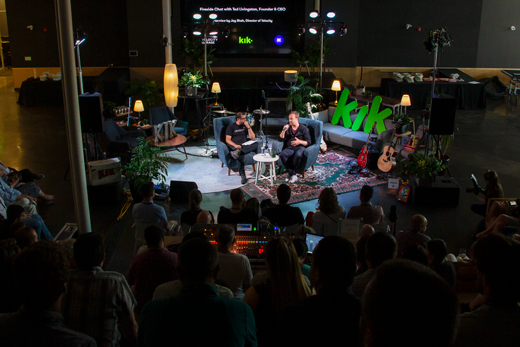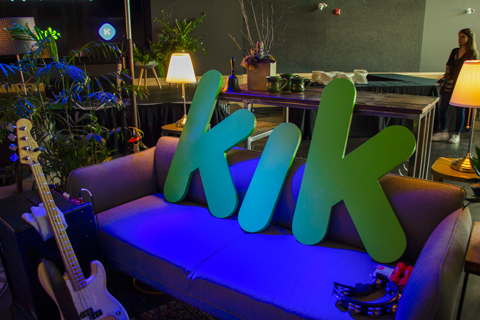Ted Livingston doesn’t believe that business has to be a zero-sum game. Crushing the opposition is not his credo.
In the early days of Kik, the mobile messaging app started by Livingston and a small group of engineering students at the University of Waterloo in 2009, the company looked for people who were “smart, nice and got stuff done.”
For many years, the recruitment policy worked, but as time went by and Livingston saw the carnage wrought by other players in the digital world, he was moved to add other values to people hired by Kik.
Among them was the slogan: “Work hard to find the win-win.”
Forging partnerships rather than destroying the competition has been one of the keys to Kik’s success over the past few years, the company’s chief executive told several hundred employees, friends and partners at a 10th anniversary celebration held Thursday at Kik headquarters in Kitchener’s Catalyst137 complex.

UW Velocity Director Jay Shah (onstage at left) in conversation with Kik CEO
Ted Livingston at Kik’s 10th birthday celebration Thursday night.
(Communitech photo: Anthony Ramsay)
For much of his 45-minute fireside chat with Jay Shah – Director of the UW Velocity program in which both Livingston and Shah took part as young entrepreneurs – Livingston kept repeating the phrase, “software is eating the world.”
And that software will be controlled by a few digital giants such as Facebook, Google and Amazon unless smaller players like Kik can keep the online universe open with mechanisms such as its Kin cryptocurrency, said the 32-year-old Livingston.
Launched by Kik in 2017, Kin will allow developers and users to get paid and establish a more open environment to avoid domination by a few large players, Livingston said. “We’ve had a 10-year history of fighting the giants and building an open future.”
And Kik has a track record of taking on those big players, he noted.
Kik came into being because there was no cross-platform messaging app linking BlackBerry, iPhone and Android devices.
When Kik started attracting users in droves – one million in the first 15 days, two million in the next seven – Research In Motion booted it off the BlackBerry platform and sued for patent infringement. Kik’s user base plunged, but the plucky startup reached a settlement with the smartphone maker and weathered the storm.
Who’s celebrating an anniversary now? asked Livingston, drawing laughs from the audience at his reference to the downfall of the BlackBerry smartphone.
The dispute was a lesson in “how to fight the giants at the highest level.”
The company is bringing the same resolve to its dispute with the Securities and Exchange Commission in the U.S., Livingston said. Earlier this year the SEC sued Kik, arguing that Kin is really a stock offering and should have been registered with the commission.
But Livingston argued that Kin was really the only way for Kik to earn money without selling ads, a “dirty” revenue model that the company wanted to avoid.
Kik was hoping to raise $100 million through its initial coin offering of Kin. More than seven million users have earned Kin across 50-plus apps since its founding.
During the interview, Shah and Livingston lounged in easy chairs under soft mood lighting with throw rugs laid on the floor. The atmosphere was living-room casual.
Shah told the Kik founder one of his best qualities is the ability to combine “American ambition with Canadian camaraderie.” In response, Livingston was moved to relate an anecdote involving former OpenText CEO Tom Jenkins. The two were having breakfast several years ago when Livingston revealed that Kik was going to launch a cryptocurrency.
When Livingston explained that it would require the co-operation of a number of players, Jenkins gave it his blessing. “You are bound to be successful because Canadians are the best at working together,” Jenkins told him.

Kik moved from a small office in north Waterloo to Kitchener’s
Catalyst137 complex in the spring. (Communitech photo: Anthony Ramsay)
Employees and guests munched on hors d’oeuvres, sipped drinks and strolled through Kik’s sleek new headquarters in the sprawling Catalyst137 building on Glasgow Street in Kitchener. The company moved in last spring after spending years in a small office in north Waterloo.
Its workforce has grown to 175 people, half in Kitchener and the rest in Tel Aviv, Israel. The Kitchener office focuses on Kik while the Israeli office specializes in Kin. Kik is also about to open a small office in San Francisco.
Asked what moment has given him the most pride over the past 10 years, Livingston said there have been “a lot of crazy moments.”
Standing out more than any was the first time Kik went viral in 2010. With millions of users pouring in, Kik was spreading faster than a disease, he noted. “We were a bunch of kids and the entire world was talking about us.”
Boasting a user base in the millions, primarily young people in their teens and twenties, Kik was also the first chat app to become a platform, to build software robots and to offer a cryptocurrency, he said.
Being the first to create something of value inevitably attracts competitors, Livingston noted. But “we embrace the challenges that come from being on the bleeding edge.”

